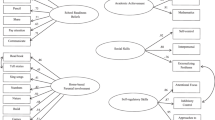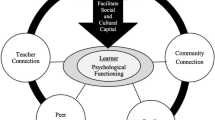Abstract
Completion of high school is a critical juncture predicting future success among adolescents. However, Black youth are often subjected to structural and micro-manifestations of structural barriers in schools, hindering their success. Moreover, research on resiliency factors associated with the academic success of Black adolescents facing structural barriers is woefully underdeveloped. In response, this study tested the associations between a resiliency factor (proposed by the Nguzo Saba and African-centered theory) and three predictors of school success (i.e., engagement, initiative-taking, and diligence). The study sample was derived from the Templeton Flourishing Children Project Pilot Study, which measured variables that contribute to “flourishing” and are important for improving youth outcomes. The sample of Black youth was evenly representative of both Black boys and girls. The results suggest that dimensions of school success can be bolstered by increased relational and personal concern among Black youth for their fellow peers, which supports that an Afrocentric worldview may be a relevant developmental asset for positive outcomes in Black adolescents. Finally, the implications of these findings are discussed, including opportunities and strategies for school behavioral health workers to assist Black youth who may be at risk for school failure.
Similar content being viewed by others
References
Bailey, Z. D., Feldman, J. M., & Bassett, M. T. (2021). How structural racism works—Racist policies as a root cause of U.S. racial health inequities. https://doi.org/10.1056/NEJMms2025396
Battle, M. (2009). Ubuntu: I in you and you in me. Church Publishing, Inc.
Belgrave, F. Z., & Brevard, J. (2016). African American boys. Springer-Verlag.
Booker, K., & Mitchell, A. (2011). Patterns in recidivism and discretionary placement in disciplinary alternative education: The impact of gender, ethnicity, age, and special education status. Education and Treatment of Children, 34(2), 193–208.
Bottiani, J. H., Duran, C. A., Pas, E. T., & Bradshaw, C. P. (2019). Teacher stress and burnout in urban middle schools: Associations with job demands, resources, and effective classroom practices. Journal of School Psychology, 77, 36–51. https://doi.org/10.1016/j.jsp.2019.10.002
Brown, D. L., & Segrist, D. (2016). African American career aspirations: Examining the relative influence of internalized racism. Journal of Career Development, 43(2), 177–189.
Catalano, R. F., Hawkins, D. J., & Toumbourou, J. W. (2008). Positive youth development in the United States: History, efficacy, and links to moral and character education. Handbook of moral and character education, 1-483.
Cherng, H. Y. S., & Davis, L. A. (2019). Multicultural matters: An investigation of key assumptions of multicultural education reform in teacher education. Journal of Teacher Education, 70(3), 219–236. https://doi.org/10.1177/0022487117742884.
Davis, C. R. (2017). “Why are the Black kids being suspended?” An examination of a school district’s efforts to reform a faulty suspension policy through community conversations. School Community Journal, 27(1), 159–179.
Garbarino, J. (2018). Miller’s children: Why giving teenage killers a second chance matters for all of us. Univ of California Press. https://doi.org/10.1177/0003122419833386
Garrett, K. J. (2006). Making the case for school social work. Children & Schools, 28(2), 115–121. https://doi.org/10.1093/cs/28.2.115
Gay, G., & Howard, T. C. (2000). Multicultural teacher education for the 21st century. The teacher educator, 36(1), 1–16. https://doi.org/10.1080/08878730009555246
Gaylord-Harden, N. K., Barbarin, O., Tolan, P. H., & Murry, V. M. (2018). Understanding development of African American boys and young men: Moving from risks to positive youth development. American Psychologist, 73(6), 753. https://doi.org/10.1037/amp0000300
Grills, C., Cooke, D., Douglas, J., Subica, A., Villanueva, S., & Hudson, B. (2016). Culture, racial socialization, and positive African American youth development. Journal of Black Psychology, 42(4), 343–373.
Grills, C., Nobles, W. W., & Hill, C. (2018). African, Black, neither or both? Models and strategies developed and implemented by The Association of Black Psychologists. Journal of Black Psychology, 44(8), 791–826. https://doi.org/10.1177/0095798418813660
Heymen, E. J. E., Van der Helm, G. H. P., Stams, G. J. J. M., & Korebrits, A. M. (2016). Measuring affective orientation in a German youth prison: A validation of the German version of the Basic Affective orientation Scale (BES) in a sample of incarcerated juvenile offenders. Journal of Forensic Psychology Practice, 16(5), 336–346.
Jagers, R. J. (1998). Afrocultural integrity and the social development of African-American children: Some conceptual, empirical, and practical considerations. Journal of Prevention & Intervention in the Community, 16(1–2), 7–34.
Jenson, J, M., Alter, C.F., Nicotera, N., Anthony, E.K., & Forrest-Bank, S.S. (2013). A positive youth development model for child and youth programs. In Risk, resilience, and positive youth development: Developing effective community programs for at-risk youth: Lesson from the Denver Bridge Project (pp.21-35). New York, NY, Oxford University Press
Kambon, K., & Bowen-Reid, T. (2009). Africentric theories of African American personality: Basic constructs and assessment. In H. A. Neville, B. M. Tynes, & S. O. Utsey (Eds.), Handbook of African American psychology (pp. 61–74). Sage Publications Inc.
Karenga, M., & Karenga, T. (2007). Principles and practices of well-being and flourishing. In H. P. McAdoo (Ed.), Black families (pp. 7–28). SAGE Publications.
Kendi, I. X. (2016). Stamped from the beginning: The definitive history of racist ideas in America. Hachette UK.
King, M. L. Jr. (2010). Where do we go from here: Chaos or community? Beacon Press.
Landrine, H., & Klonoff, E. A. (1994). The African American acculturation scale: Development, reliability, and validity. Journal of Black Psychology, 20(2), 104–127. https://doi.org/10.1177/00957984940202002
Lateef, H. (2020). African-centered frameworks of youth development: Nuanced implications for guiding social work practice with Black youth. Child and Adolescent Social Work Journal, 1-8.
Lateef, H., Amoako, E. O., Nartey, P., Tan, J., & Joe, S. (2021). Black youth and African-centered interventions: A systematic review. Research on Social Work Practice, 10497315211003322.
McGinnis, CM. (2017). Effects of implicit bias on teachers’ expectations of student relationships (Unpublished thesis). University of Nebraska—Lincoln, Lincoln, Nebraska.
Mugumbate, J., & Nyanguru, A. (2013). Exploring African philosophy: The value of ubuntu in social work. African Journal of Social Work, 3(1), 82–100.
National Center for Education Statistics [NCES]. (2019). Indicator 15: Retention, suspension, and expulsion. https://nces.ed.gov/programs/raceindicators/indicator_rda.asp#info
National Center for Education Statistics [NCES]. (2021). Public high school graduation rates. https://nces.ed.gov/programs/coe/indicator/coi
Novak, A. (2019). The school-to-prison pipeline: An examination of the association between suspension and justice system involvement. Criminal justice and behavior, 46(8), 1165–1180. https://doi.org/10.1177/0093854819846917
Pinckney, H. IV., Outley, C., Brown, A., Stone, G., & Manzano-Sánchez, H. (2020). Rights of Passage programs: A culturally relevant youth development program for Black youth. Journal of Park & Recreation Administration, 38(3).
Simon, K. M. (2020). Them and me—The care and treatment of Black boys in America. New England Journal of Medicine, 383(20), 1904–1905.
Tourse, R. W., Hamilton-Mason, J., & Wewiorski, N. J. (2018). Systemic racism in the United States. Cham, Switzerland: Springer International.
Wang, M. T., & Huguley, J. P. (2012). Parental racial socialization as a moderator of the effects of racial discrimination on educational success among African American adolescents. Child development, 83(5), 1716–1731.
Wang, M. C., Joel Wong, Y., Tran, K. K., Nyutu, P. N., & Spears, A. (2013). Reasons for living, social support, and Afrocentric worldview: Assessing buffering factors related to Black Americans’ suicidal behavior. Archives of Suicide Research, 17(2), 136–147. https://doi.org/10.1080/13811118.2013.776454
Woodson, L., & Harris, S. M. (2018). Teacher and student demographic variables which predict teacher referrals of males for special education evaluation. Journal of At-Risk Issues, 21(1), 32–43.
Wun, C. (2016). Unaccounted foundations: Black girls, anti-Black racism, and punishment in schools. Critical Sociology, 42(4-5), 737-750. https://doi.org/10.1177/0896920514560444
Zuberi, T., & Bonilla-Silva, E. (Eds.). (2008). White logic, white methods: Racism and methodology. Rowman & Littlefield Publishers.
Acknowledgements
The authors would like to thank Child Trends for granting access to the Flourishing Children Project Data Set for the analysis performed in this study. We also note that Child Trends bears no responsibility for the current analysis or interpretations of the data presented in this publication.
Author information
Authors and Affiliations
Corresponding author
Ethics declarations
Conflict of Interest
The authors declare no competing interests.
Additional information
Publisher's Note
Springer Nature remains neutral with regard to jurisdictional claims in published maps and institutional affiliations.
Rights and permissions
About this article
Cite this article
Lateef, H., Brugger, L., Boyd, D. et al. Affective Orientation and School Persistence Among African American Youth: Implications for Afrocentric Youth Research and Practice. J Afr Am St 26, 4–15 (2022). https://doi.org/10.1007/s12111-021-09569-9
Accepted:
Published:
Issue Date:
DOI: https://doi.org/10.1007/s12111-021-09569-9




